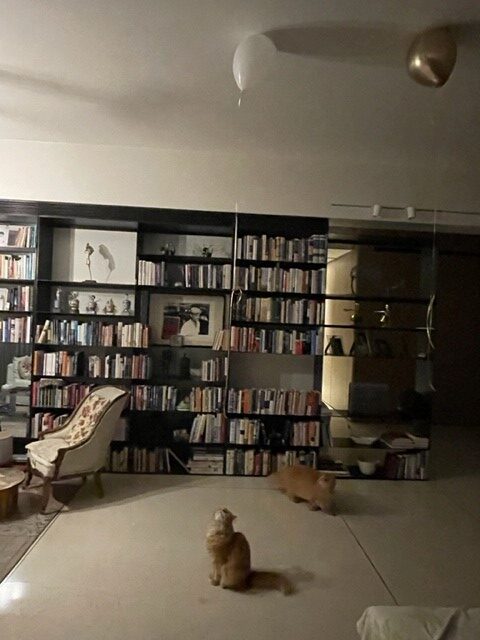Not Random Journal Entries
December 23rd: I looked up تقوقع in google translate. I got “squat.” Terrible! They ought to do something about that tool. But I suppose the state of us is a kind of emotional and mental squat. Some obviously squatting way more than others in this country. Around us. In Syria, Jordan, Palestine, Iraq.
I have Covid. A three-year chase, and there I was caught and stricken. Isolation. Which might explain my mental and emotional squatting. I got it from Aireen, my housekeeper. A Christmas party over the weekend in a crowded space. Mild. At least neither one of us has to isolate in their room.
December 24th: My friends are envying me. The traffic jams are apparently the kind you would wish on your worst enemy.

My sister told me her hairdresser was cursing this morning. Returning Lebanese making life more miserable than it already is: traffic, fully booked restaurants for weeks on end, skyrocketing prices.
But they bring in precious US dollars and get things going a bit, she proposed gingerly. He hissed. For whom?
Those who stay and those who leave: a new chapter in Lebanon’s eternal story. Around 250,000 Lebanese have packed up since 2019. At least that’s the number they keep throwing around. Add those to the million out, they say, between 2005 and 2018.
I have to do some checking on these numbers. Immigration is still our best trade, though. Approximately $6.5 billion in remittances in 2021.
December 26th: My routine hasn’t changed. I even exercised this morning. In the living room.
More notes on Raja Shehadeh’s memoir, We Could Have Been Friends, my Father and I, for the second blogpost. Flawless pen, Raja’s. Each page is a snapshot of Palestinian history. The granularities; so very intimate and yet speak to a collective quandary. Illuminating, I want to add, but I find I am relying too much on this word: illuminating.
Early in the book, he describes the contents of his father’s archives. In the box he finds “his black necktie, his fountain pen and even his shaving brush.” This is more than 30 years after Aziz’s death. I remember sifting through my father’s belonging in 2020, when he went: neckties and fountain pens and papers and letters and photos and notes. The pants and shirt he wore and placed neatly on the chair the night before he passed are still there.

December 30th: Done with Covid. Summer almost outside. Friends are swimming in the sea. They tell me it’s pristine. I tell them they’re ill.

January 2nd: Lebanon’s predicament! Mind numbing how even the best commentators keep repeating themselves. I mean how many different ways can you describe the reasons for the country’s collapse? Or the malevolence of the cartel that bizarrely still goes by the name of the ruling class? Or the sinister purpose of this malign directive of the Central Bank and that? And how thuggish they all are? And how screwed we all are.
Jad Ghosn had a good podcast the other day.
Remember these figures!
Imports in the first 11 months of 2022: $18 billion.
Imports in 2018 before we all officially went to hell: $20 billion.
My own notes from before for an earlier blopost:
GDP in 2021: $18 billion.
GDP in 2018: $58 billion.
Who’s the king?
Context. Get that? Context!
Ghosn is leaning towards Ineptocracy, in describing the Lebanese system. In Arabic, he calls it حكم البهايم.
Tempting, but the ailment of our dear leaders is depravity, not stupidity or ineptitude.
The difference? For us, that is.
A mental exercise: assume they were incompetent but not depraved, would we be nose-deep in this morass? Simplistic, I know. But go ahead! Answer anyway.
Here’s why I don’t bother here with the formal definition of Ineptocracy:
“A system of government where the least capable to lead are elected by the least capable of producing, and where the members of society least likely to sustain themselves or succeed, are rewarded with goods and services paid for by the confiscated wealth of a diminishing number of producers.”
No place for definitions of that sort in journals of this kind.
Then there is this inane question that everybody keeps asking: Will we have a new president soon? Typically followed by: They should lock up parliament and force them to elect one.
Well-insulated our Lebanese bubbles. Not even a whiff of reality seeps through.
You feel stupid asking helpfully: What difference would he make, this president? What would all of them make? To us. Except more of this.
To which you get this: Well, at least things will loosen up a bit.
What the hell does that mean? Shake things up a bit. Shake what up?
Or from Hezbollah’s detractors at one dinner recently: of course, a president matters. He has a veto, he can block appointments. He can dissolve parliament. He can stand up to Hezbollah. Shut down smuggling through ports and airports…
Really?… I mean, really?
Quite tragicomic, the sight of us debating the same thing over and over again. An utterly frivolous Lebanon run by an utterly depraved elite doing their utterly depraved business, and a band of folks–observers, thinkers, concerned citizens and the like–analyzing their every move.
You never ever want debased people to feel at ease being debased. True! You do that and history will have no trace of you; where you were and what you thought and what you did. And it matters that the corruptions are caught, the errors recorded, the excesses cited, the hypocrisies exposed, the sectarianisms flagged, the masters mocked…
But at some point, it all becomes…I don’t know? Noise. We’re busy analyzing over here, and they’re busy sniggering over there. Two worlds. A cast of characters doing their thing, and an audience with notebooks, iphones, and ipads commenting about it. They act, we comment. They keep acting and we comment some more.
There are implications to all this destruction–calamitous ones for this place and us. But hardly anything on tomorrow and its details. The sewage, the water, the electricity, the land, the sea, the food, the regions, the poor, the schools, the young. The stuff of life. Or death.

Jan 4th: Had lunch with a very talented young Lebanese who works in Boston. MIT grad. He was telling me about another very young 34-year-old Lebanese from Tripoli. Middle class. Went to AUB, then to MIT for a masters and a PHD. He is a tenured professor there now.
“In what?” I ask.
“In stuff that I don’t understand,” he answers.
I laughed. Shook my head.
So very sad. This place. Such individual genius, such collective failure.
****
On Another Note
With each interview and podcast come new questions and insights about This Arab Life. In many of these encounters I am finding myself on ever different journeys out of the silence. My conversation with Bill Law on the Arab Digest podcast a few days ago was one such journey.
Admirers of Schubert? Here’s Alfred Brendel’s “Some Winter Wonders” on the composer’s Winterreise (NYRB, 2015):
When Schubert was born in 1797, Vienna was the musical capital of Europe. Of the three composers responsible for the city’s preeminence, Mozart was dead, and Haydn had more or less retired; only Beethoven remained active during Schubert’s short life. Though the two composers lived in the same city, they were hardly, if at all, in touch. Both wrote their audacious final chamber music works virtually next door to and independently of one another within a period of little more than three years. In 1827, the year Beethoven died, Schubert had started composing Winterreise, his supreme song cycle.
